Vietnam’s legal framework on Intercountry adoption procedures
Adoption means establishing parent and child relationships between the adopter and adopted persons. In fact, intercountry adoption is no longer an unpopular thing. The following article will provide readers with conditions as well as adoption procedures pursuant to the Vietnam’s substantive law.
1. Cases of intercountry adoption
Under the law on adoption, cases of intercountry adoption include:
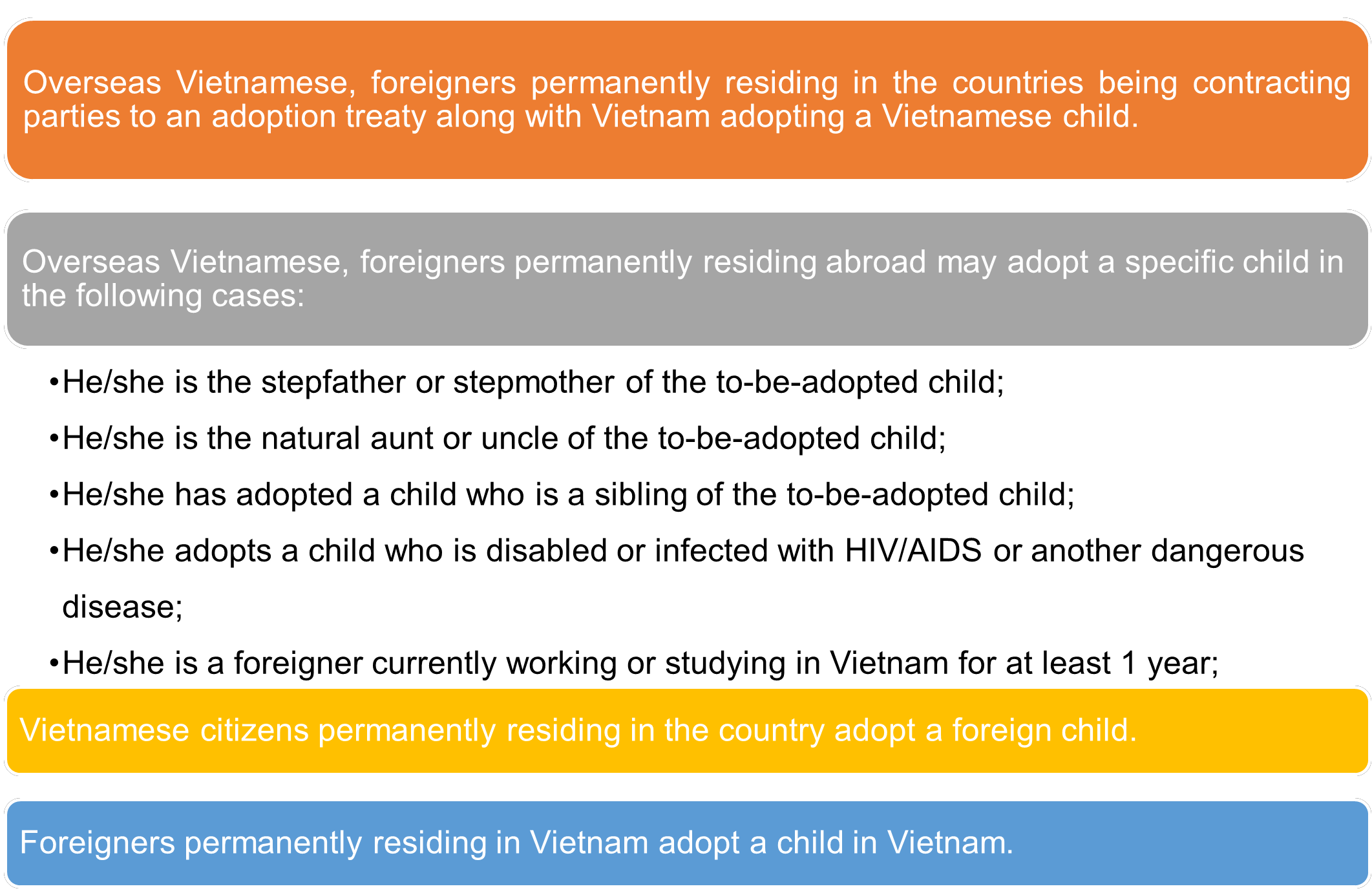
2. Conditions for the adopters:
To avoid cases of taking advantage of child adoption to commit illegal acts, the Law on Adoption has set out several specific conditions for a person to be allowed to adopt a child. Specifically, the Law on Adoption divides intercountry adoption into two large groups and sets out detailed requirements for adopters:
Case 1: Vietnamese residing abroad, foreigners permanently residing abroad, and foreigners permanently residing in Vietnam adopting Vietnamese children must fully meet the conditions prescribed by their country’s law and the provisions of Article 14 of the Law on Adoption 2010.
Case 2: A Vietnamese citizen adopting a foreign child must fully satisfy the conditions prescribed in Article 14 of the Law on Adoption 2010 and the law of the country where the adopted person permanently resides.
2.1. Conditions for adopters
According to clause 1 Article 14 of the Law on Adoption, a person/persons can adopt a child or children if they fully meet the following conditions:
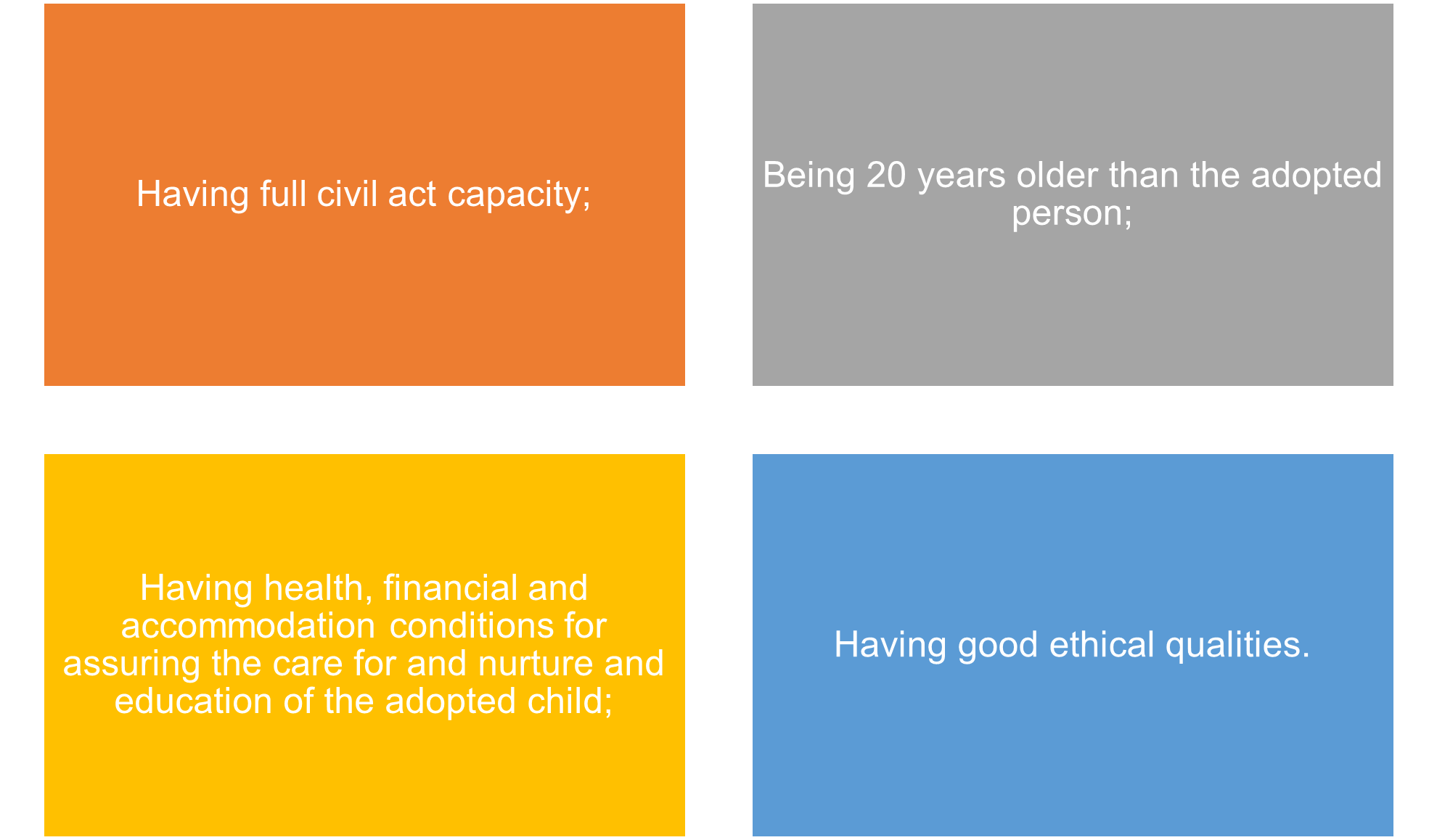
However, the Law on Adoption still makes an exception for cases in which the adopter is a stepfather, stepmother, aunt, or uncle. Specifically, when the stepfather or stepmother adopts a stepchild or an aunt or uncle adopts a nephew or cousin, they do not have to be:
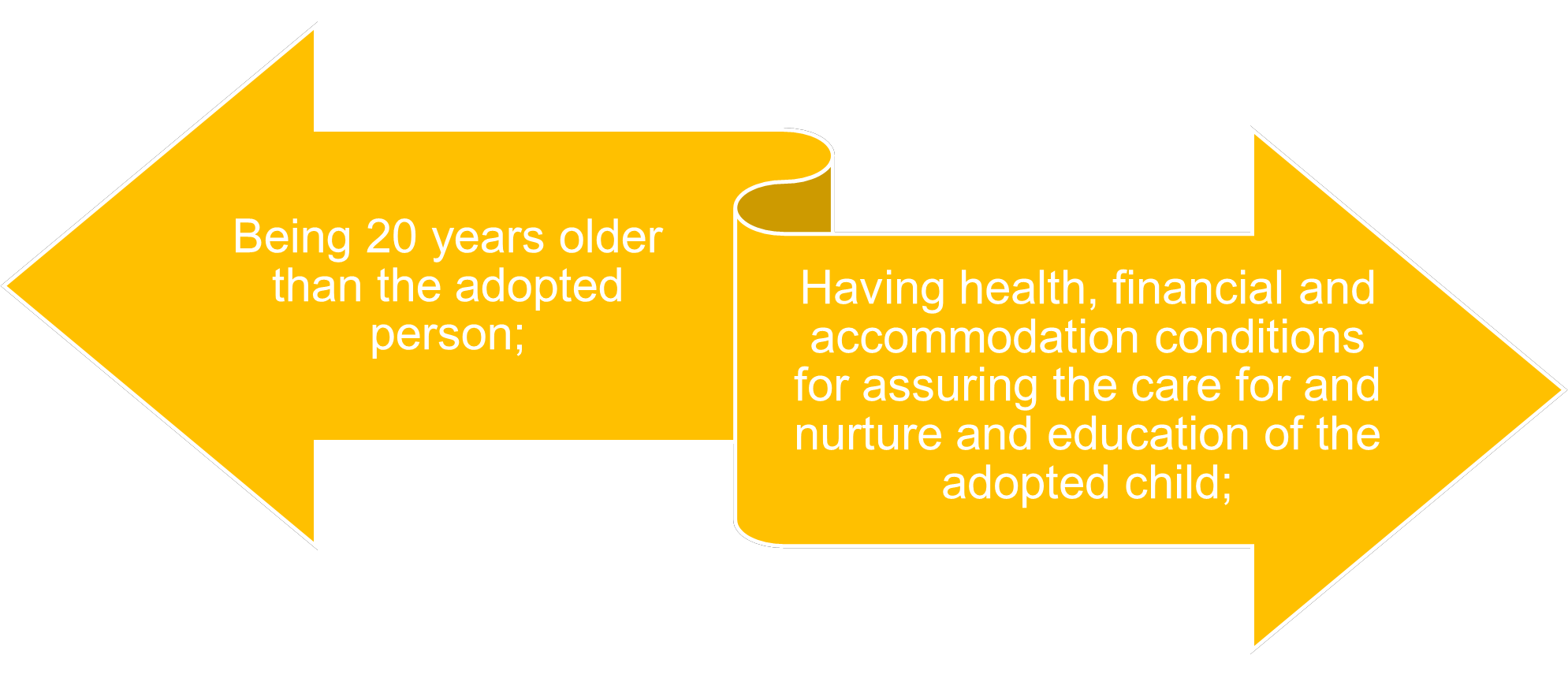
2.2. Persons may not adopt a child
Clause 2 Article 14 of the Law on Adoption regulates that the following persons cannot adopt a child or children:
- Having some of the parental rights over a minor child restricted;
- Currently serving an administrative handling decision at an educational institution or medical treatment establishment;
- Currently serving an imprisonment penalty;
- Having a criminal record of commission of any of the crimes: intentionally infringing upon another’s life, health, dignity, and honour; maltreating or persecuting one’s grandparents, parents, spouse, children, grandchildren, or caretaker; enticing or compelling a minor to violate the law or harboring a minor violator; trafficking in. fraudulently swapping or appropriating children, which has not been remitted yet.
Besides the conditions for adoption, the intercountry adoption also needs to comply with the principle of priority order in the selection of substitute families in Article 5 of the Law on Adoption. The order is regulated as follows:
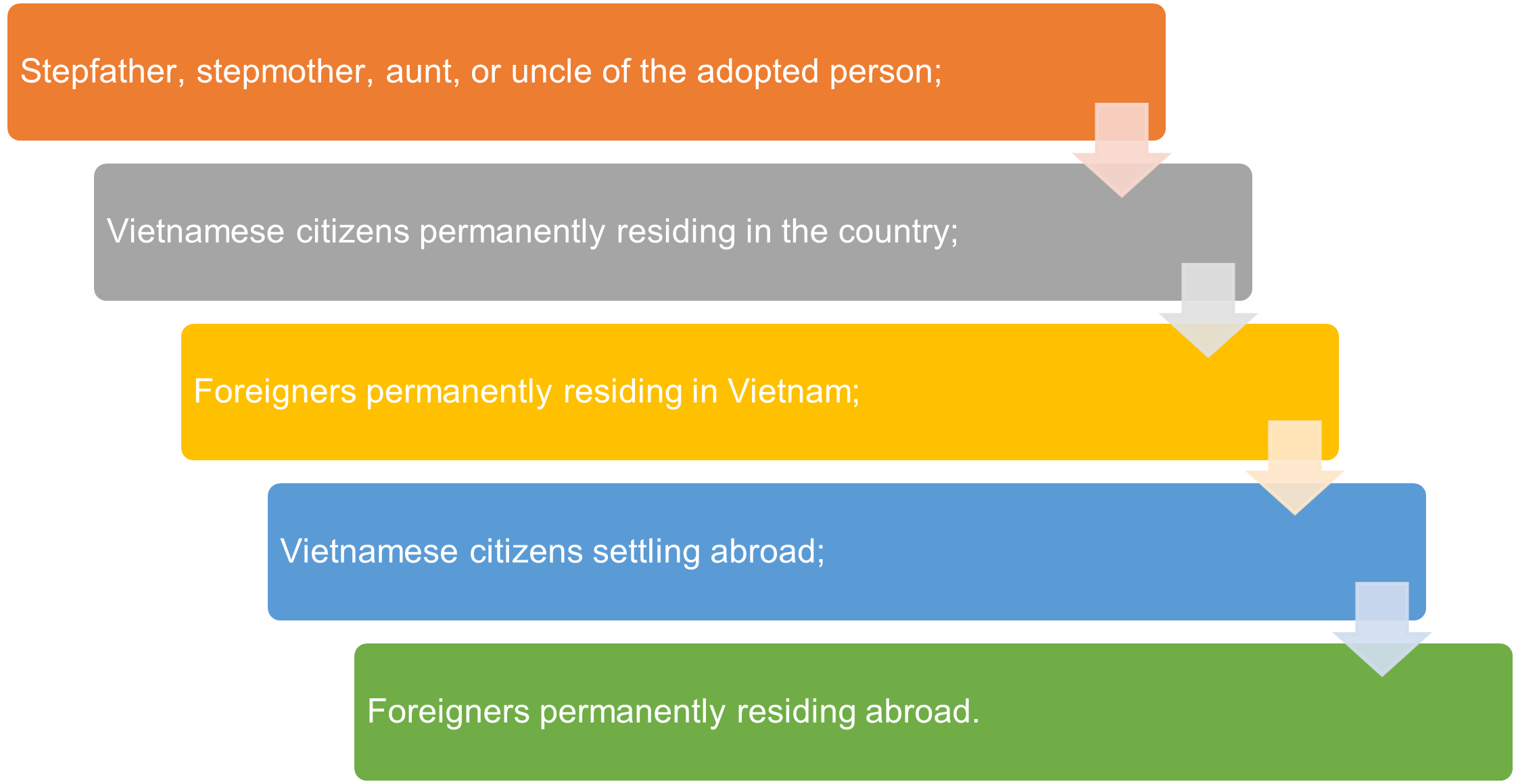
3. The procedure of adoption
Pursuant to the Law on Adoption, the competence to register intercountry adoptions is regulated as follows:
- The People’s Committee of the province or municipality (herein referred to as provincial-level People’s Committee) where the adopted permanently reside is competent to register intercountry adoption; in case a child in a nurturing center is adopted, the provincial-level People’s Committee where that child support establishment located is competent to register intercountry adoption.
- The Provincial-level Justice Departments shall register the intercountry adoption after receiving the provincial-level People committee decision.
3.1. The procedures of intercountry adoption in case the adopted resides in Viet Nam shall follow these steps
- Step 1: Prepare the dossier
3.1.1. The dossier of the adopter and the procedure to submit
a) The dossier of the adopter
The dossier shall be made in 2 sets and must comprise:
The written request for adoption
Document issued or certificated by competent authorities in the country where the adopter permanently resides:
- A copy of the passport or identity card or a valid substitute paper;
- A written permission for adopting a person in Vietnam;
- A completed questionnaire on psychology and family;
- A health certificate;
- An income and property certificate;
- The judicial record sheet;
- Written certification of the marriage status; and
- A document evidencing the case of adoption of a specific child
b) The procedure to submit the dossier
Case 1: Adopting a non-specific child
In this case, the adopter residing in a country that has acceded to an adoption treaty to which Viet Nam is a contracting party shall submit the dossier to the Department of Child Adoption (a unit of the Ministry of Justice) via the child adoption organization of that country (which is licensed to operate in Viet Nam); if that country does not have any licensed organization in Viet Nam, then the adopter shall submit the dossier to the Department of Child Adoption through the diplomatic missions or the Consulate of that country in Viet Nam.
Case 2: Adopting a specific child
Those persons who adopted a specific child shall submit the dossier directly to the Department of Child Adoption. If the adopter has a plausible reason to not submit the dossier directly to the Department of Child Adoption, he/she may make an authorization to the relative who permanently resides in Viet Nam to submit through the registered post.
3.1.2. The dossier of the adopted and the procedure to submit
a)The dossier of the adopted
The dossier shall be made in 03 sets and must comprise:
– The birth certificate;
– A health certificate granted by a district-or higher-level health agency;
– Two photos of the whole body looking straight, taken within the past 6 months;
– A record of certification made by the commune-level People’s Committee or police of the place in which the child is abandoned, for abandoned children; the death certificate of the natural parent(s) or a court decision declaring the natural parent(s) of the child is (are) dead, for orphans; a court decision declaring the natural parent(s) of the person introduced for adoption is (are) missing, for persons introduced for adoption whose parent(s) is (are) missing; a court decision declaring the natural parent(s) of the person introduced for adoption have lost civil act capacity, for persons introduced for adoption whose parent(s) has (have) lost civil act capacity;
– The receipt decision, for children in a nurturing centre;
– Document on the remarkable characteristics, hobbies, and habits of the child;
– A document evidencing the failure of finding a domestic substitute family under clause 2 Article 15 of this Law.
b) The procedure to submit
The dossier of the adopted is submitted to the provincial-level Justice Department at which the adopted permanently resides.
Note: Papers and documents in the dossier of the adopter and the dossier of the adopted compiled, granted or certified by a competent foreign agency must be consular legalized for use in Vietnam unless they are exempt from consular legalization under a treaty to which the Socialist Republic of Vietnam is a contracting party or on the reciprocity principle.
Consular legalization means the competent Vietnamese agencies’ certification of stamps, signatures and titles on foreign papers and documents for being recognized and used in Vietnam.
- Step 2: Examining and verifying dossiers and certifying children’s eligibility for being adopted
Within 20 days after receiving a complete and valid dossier, the provincial-level Justice Department shall examine the dossier and consult with the child’s parents, or the guardian (if the parents are both dead or missing or have lost civil capacity or are unidentifiable), or the adopted if he/she is 9 years old or older.
For an abandoned child who needs to be verified, the provincial-level Justice Department may request the provincial-level Police Department to verify; the requested Police Department shall conduct verification and issue a written reply within 30 days after receiving the request of the provincial-level Justice Department.
After completing the examination and verification, if seeing that the child is eligible for intercountry adoption, the provincial-level Justice Department shall issue a certificate to this effect and send it to the Ministry of Justice.
- Step 3: Examining and transferring the adopted child’s dossier
Within 15 days after receiving a complete and valid dossier, the Department of Child Adoption shall examine and process the dossier to make sure that:
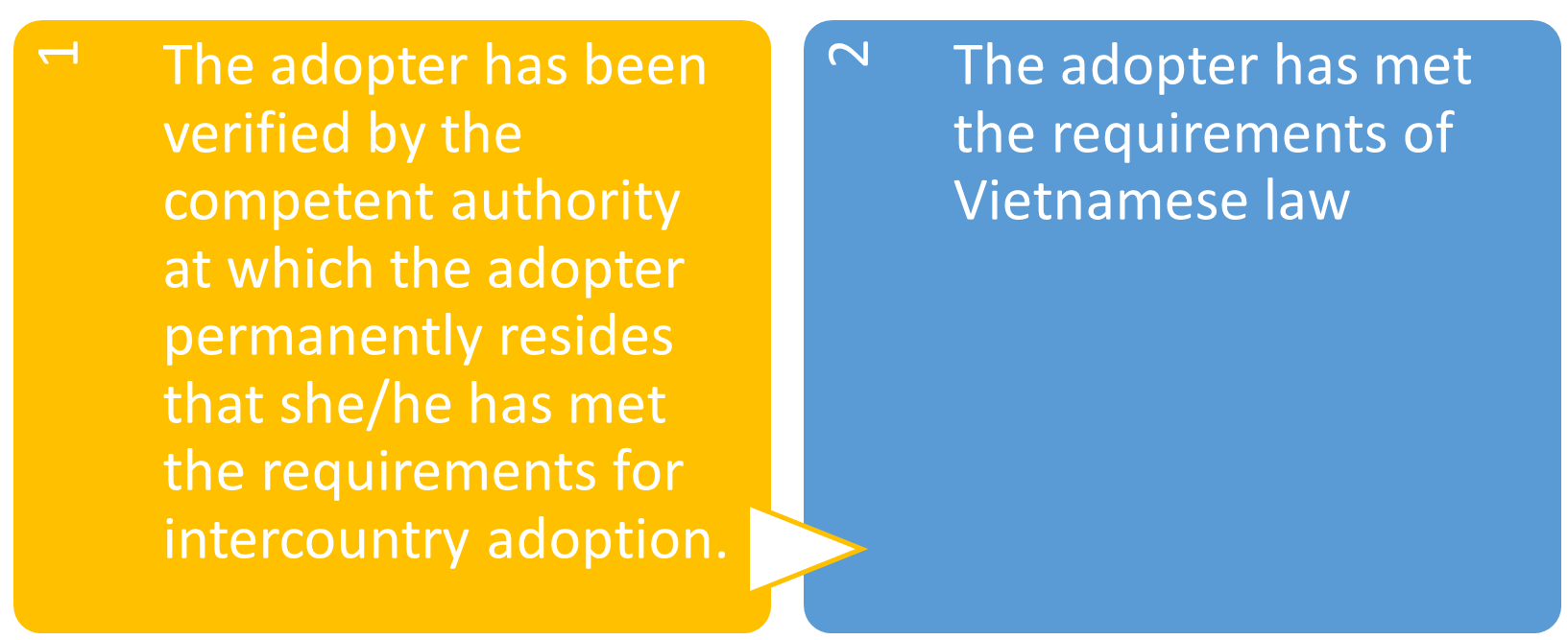
When inspecting the dossier, if necessary, the Department of Child Adoption may consult with the psychologist, health centre or family to make sure that the adopter has good conditions to nurture and educate the adopted.
The adopter’s dossier shall be accepted if it all the above requirements; in case it is dismissed, the Department of Child Adoption will return the dossier along with a written reply.
For the case of adopting a specific child, the adopter’s dossier will be transferred to the provincial-level Justice Department at which the adopter permanently resides for submission to the People’s Committee to examine and decide.
- Step 4: Decision to allow children to be adopted
Within 15 days after receiving a document from the competent agency of the country in which the adopter permanently resides notifying the consent of the adopter to the introduced child and certifying that the child will be allowed to enter and permanently reside in the country in which the child is adopted, the Ministry of Justice shall notify it to the provincial-level Justice Department.
After receiving a notice from the Ministry of Justice, the provincial-level Justice Department shall submit the case’s dossier to the provincial-level People’s Committee for the decision to allow the child’s intercountry adoption.
Within 15 days after receiving the dossier from the provincial-level Justice Department, the provincial-level People’s Committee shall decide to allow the child’s intercountry adoption. If the provincial-level People’s Committee refuses, they shall notify by written reply.
- Step 5: The delivery and receipt of the adopted
After receiving the decision of the provincial-level People’s Committee, the provincial-level Justice Department register the adoption, organize the child delivery and receipt ceremony at its head office in the presence of the adoptive parent(s), the adopted, the representative of the nurturing centre (if the adopted is from the nurturing centre), the parent(s) or guardian of the child (if the child is living with his/her family).
The delivery and receipt of an adopted child must be recorded in a minute bearing the signatures or fingerprints of the involved parties and the representative of the provincial-level Justice Department.
3.2. The intercountry adoption procedures in case the adopted reside abroad shall follow these steps:
- Step 1: Submitting the adopter’s dossier to the Ministry of Justice
The dossier shall comprise:
– The written request for adoption;
– A copy of the passport or identity card or a valid substitute paper;
– The judicial record sheet (issued within the past 06 months);
– Written certification of the marriage status;
– A health certificate granted by a district-or higher-level health agency (certificated within the past 06 months);
– A written document verifying the family and accommodation status, the economic condition granted by the commune-level People’s Committee at which the adopter permanently resides, except for the case of adopting a specific child.
- Step 2: The Ministry of Justice examines and issues the certification that the adopter has met the requirements for adopting under Vietnamese law
Within 30 days after receiving the complete and valid dossier, the Ministry of Justice examines and issues the certification that the adopter has met the requirements for adopting under Vietnamese law.
If necessary, the Ministry of Justice may request the provincial-level Justice Department at which the adopter permanently resides to verify, in this case, the period may last longer, but will not beyond 60 days.
- Step 3: Carrying out the recording procedure at the provincial-level Justice Department and the commune-level of the place in which the adopter permanently resides.
Note: In addition to the documents and dossier prepared in Viet Nam, the adopter also needs to contact the agency capable of legal support in the country where the adopted resides to be able to meet the necessary conditions and procedures under the law of the country where the adopted lives.
We are always ready to support customers with information related to Intercountry adoption procedures. Please contact us directly via hotline 0916 545 618 or email hung.le@cnccounsel.com and thanh.tran@cnccounsel.com for specific advice.
This newsletter has been prepared or used for the purpose of introducing or updating customers about issues and/or the development of legal positions in Vietnam. The information presented in this newsletter does not constitute advice of any kind and are subject to change without notice.






